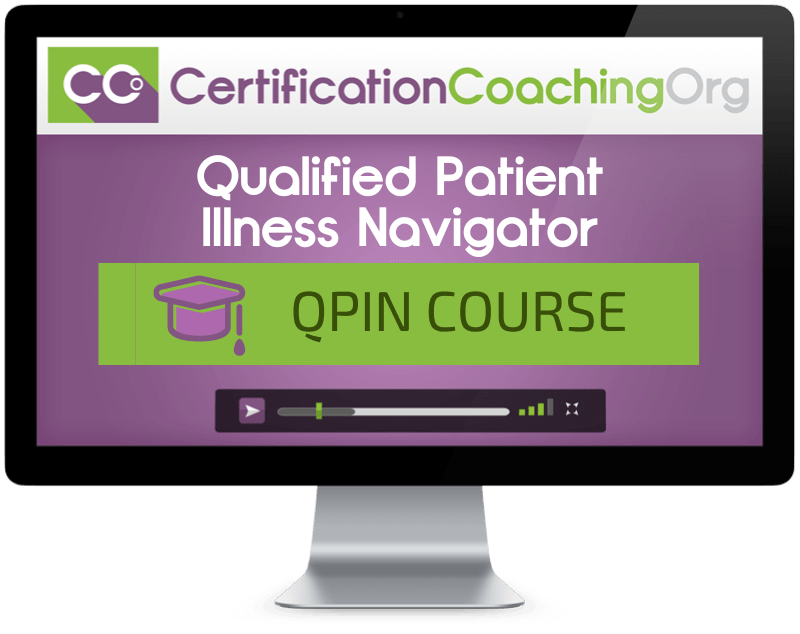Qualified Patient Illness Navigator Course
A Course That Will Teach Healthcare Professionals to Guide Patients Through the Healthcare System and Complex Medical Procedures or Treatments

A patient illness navigator, also known as a patient navigator, is a healthcare professional who guides patients through the healthcare system, particularly during complex medical processes or treatments. Their role includes:
- Assessment and Planning: Evaluating patient needs and developing a care plan.
- Education: Providing information about the illness, treatment options, and healthcare resources.
- Coordination: Helping to schedule appointments, coordinate between different healthcare providers, and manage medical records.
- Support: Offering emotional and logistical support, addressing barriers to care, such as financial or transportation issues.
- Advocacy: Ensuring that the patient’s preferences and concerns are communicated and respected by the healthcare team.
Patient navigators aim to improve healthcare outcomes, patient satisfaction, and the overall efficiency of the healthcare delivery process. They are particularly beneficial for patients with new diagnoses, chronic diseases, cancer, or other serious health conditions..
In addition to the core Qualified Patient Illness Navigator Course training materials, we also provide access to certified CCO instructors to help answer any questions that may come up.
Who Can Benefit From This Qualified Patient Illness Navigator Course:
- Existing students enrolled inside or outside CCO that require supplemental or expanded training to guide patients through the healthcare system and complex medical procedures or treatments.
- Administrative Healthcare workers interested in expanding their knowledge of navigating patient illness.
- Clinical Practices looking to code G0023 as a service with patients. You can receive reimbursement for PINs starting in 2024.
- Important Pre-Requisite: This course is for healthcare professionals who have at least a basic knowledge of the disease process and healthcare system since we do not teach this in the course. If you require this knowledge, we suggest taking our Pathophysiology Course and/or Pharmacology Course.
Whats’s Included In Our Qualified Patient Illness Navigator Course
7 Hours of Video Lessons
Includes 7 hours of Qualified Patient Illness Navigator Video Lessons.
QPIN Case File Template
Includes a printable Qualified Patient Illness Navigator Case File Template to assist with real life patient encounters.
Easy to Understand Style
We know it can be hard to learn coding material. That’s why we pride ourselves on our “easy to understand” teaching style. Keeping you engaged and learning is our top priority.
Self-Paced, Online Courses
All our courses are available 24 hours a day, 7 days a week from any internet-enabled device. You can learn at your own pace and rewind whenever necessary to re-learn topics.
9 Months of Continuous Access
We include 9 months (270 days) of continuous access to the course. If you decide to take a break, you can always return anytime within those 9 months to pick up where you left off.
Qualified Patient Illness Navigator Course Certificate
Once you complete the QPIN Course, you will receive a Qualified Patient Illness Navigator Course Certificate for your records.
Student Support Hub
Our Student Support Hub is where students, staff and instructors can meet virtually inside a private discussion area to ask questions or simply chat about course topics and news.
QPIN Course Contents
A patient navigator should have a solid understanding of the business side of medicine to effectively assist patients in navigating the complexities of the healthcare system. In this module, you will cover critical areas such as healthcare insurance, medical billing and coding, healthcare economics, and the importance of understanding healthcare regulations. Additionally, the module will focus on revenue cycle management, quality and performance metrics, health information technology (HIT), and patient advocacy. By mastering these topics, patient navigators will be equipped to guide patients through the healthcare system with confidence and expertise.
A patient navigator plays a vital role in guiding patients through the complexities of the healthcare system by offering support, information, and advocacy to ensure quality care. In this module, key components of the patient navigator role will be explored, including patient support and empowerment, effective communication skills, and navigation of healthcare systems. Additionally, the module covers cultural competency, advocacy for patients’ rights, resource referral and coordination, documentation and confidentiality, and the importance of continuous learning and professional development. Mastering these aspects enables patient navigators to provide essential guidance and care to patients in need.
This module delves into the complexities of working with complex patients who often present unique challenges and require specialized care. Patient navigators will learn the skills necessary for conducting comprehensive assessments, collaborating with multidisciplinary teams, and coordinating care across healthcare settings. Key areas such as patient education, psychosocial support, and cultural sensitivity will be emphasized to ensure that complex patients receive the holistic support they need. Additionally, the module will address the importance of flexibility and adaptability in patient care, as well as self-care strategies to prevent burnout for those working with demanding patient populations.
In this module, you will conduct a comprehensive review of disease processes commonly encountered in healthcare settings. Patient navigators must understand the pathophysiology, signs and symptoms, and treatment options for various diseases to provide effective support to patients. This includes familiarity with diagnostic tests, treatment modalities, and patient education strategies, empowering patients to make informed healthcare decisions. Additionally, the module covers disease prevention, health promotion, and the importance of collaboration with healthcare providers to ensure coordinated care. Mastering these areas enables patient navigators to optimize health outcomes and support patient well-being throughout their healthcare journey.
In this module, you will explore the dynamics and roles within the healthcare team, focusing on how patient navigators facilitate communication and collaboration to ensure comprehensive, patient-centered care. Understanding team dynamics, roles, and responsibilities is essential for effective collaboration between healthcare professionals. Patient navigators act as liaisons, advocating for patients and ensuring the seamless coordination of care. This module also emphasizes the importance of communication skills, interdisciplinary collaboration, conflict resolution, and continuous quality improvement efforts, all of which enable patient navigators to support and enhance team-based care for optimal patient outcomes.
In this module, you will delve into the importance of effective communication skills for patient navigators, which are fundamental for building trust, fostering collaboration, and improving patient outcomes. Patient navigators must communicate clearly and empathetically, actively listen to patient concerns, and adapt to varying levels of health literacy. This module will also cover cultural competence, supporting informed decision-making, and facilitating communication within the healthcare team. Additionally, conflict resolution and accurate documentation are emphasized as key components of patient care. By mastering these skills, patient navigators can enhance patient satisfaction and ensure patient-centered, coordinated care.
In this module, you will examine the crucial aspects of medical law and ethics, which are essential for patient navigators to provide responsible and ethical support to patients. Topics include understanding healthcare laws, such as patient rights and informed consent, as well as regulations like HIPAA that protect patient privacy. You will also explore core ethical principles in healthcare, patient advocacy, and strategies for handling ethical dilemmas. Emphasizing cultural and ethical sensitivity and legal documentation, this module equips patient navigators with the knowledge to navigate complex ethical and legal issues while ensuring high-quality, patient-centered care.
In this module, we will explore the importance of understanding Social Determinants of Health (SDOH) and their impact on patient care. Patient navigators should recognize how factors like economic stability, education, social context, healthcare access, and environment influence health outcomes and disparities. You’ll learn how to identify SDOH barriers through assessments, connect patients to community resources, and advocate for policies promoting health equity. This module also covers collaborative care planning with healthcare teams and monitoring patients’ progress in addressing SDOH, ensuring comprehensive support for patients to achieve better health and well-being.
In this module, you will explore the essential aspects of developing and managing a patient’s plan of care. Patient navigators begin by conducting comprehensive assessments to set patient-centered goals, ensuring that plans reflect individual preferences and medical needs. Interdisciplinary collaboration is crucial, involving input from various healthcare professionals to create a comprehensive care plan. You’ll also learn how patient navigators coordinate care by arranging appointments and facilitating communication between providers.
Meet Your QPIN Course Instructor
Alicia Scott, CPC, CPC-I, CRC, QPIN
CCO Education Director
Alicia has been working in the medical field for over 20 years. She first learned about medical coding while working in a medical records department at a resort town hospital near where she was raised. Through the years she has held several jobs in the medical field from, CNA, EMT, Pharmacy technician and Medical Records Abstractor and Analyst. Outside of the medical field she has worked as a Real Estate agent, and owned her own on-line retail business. The medical field has always been where she felt the most comfortable.
Alicia has taught medical coding, billing and medical law and ethics at a private college. She also did contract work in HCC Risk Adjustment and discovered she really enjoyed ICD work. Because she loves to learn Alicia is working towards her Masters in Health Care Administration with an emphasis on education. Having taken many online classes through the years to complete her degree she feels very comfortable with both face to face and on-line learning. Alicia will tell you that not only does she love medical coding but she has a passion for teaching it. Alicia lives in the middle of Texas with her husband who is a Pastor, five of her six children, three dogs and two cats.

Invest In Your Future Today!

Use Coupon Code in Cart: CCO4J25
Yes! Please I’d Like to Order The Qualified Patient Illness Navigator Course
I understand I’ll be receiving online access to the entire Qualified Patient Illness Navigator Course plus access to the BHAT® Cave and other CCO resources listed on this page for a small investment!

Frequently Asked Questions
Is a Textbook Needed for The QPIN Course?
No. The Qualified Patient Illness Navigator Course includes all video content directly inside the CCO Community Learning Area. All you need is high-speed online access for viewing the videos.
Are There Any CEUs Included?
No, there are no CEUs included with this course. If you need CEU’s, please consider joining the CCO Club. https://www.cco.us/club/
Are There Any Graded Exams?
No, this Qualified Patient Illness Navigator Course does not include any graded exams. Students are given access to lessons for self-paced learning along with a community area to discuss any challenges they may encounter.
Can I Download or Play the Videos Offline?
Videos can only be played while connected to a high-speed internet connection. We do not allow videos to be downloaded or played offline.
When Will the QPIN Course Be Available for Viewing?
The Qualified Patient Illness Navigator Course is fully ready for immediate online viewing. All modules have been recorded and loaded into the CCO Community Learning Area.
What Is the Refund or Cancellation Policy?
Due to the instant availability of internet-based training, CCO does not provide refunds or cancellations on any of our products including Courses, Review Blitzes, Practice Exams, Bundles, CEU Classes, Combos or CCO Club payments.
Where Can I Learn More About CCO?
Since 1999, we’ve been proudly training thousands of students to help them pass their certification exams. If you feel the need to see examples of our teaching style, please visit our YouTube channel with hundreds of videos and over 2 million views. If you would like to read past student reviews on our products, you’re welcome to read through hundreds of testimonials.
![[CCO] Certification Coaching Organization LLC [CCO] Certification Coaching Organization LLC](https://www.cco.us/wp-content/uploads/2015/05/CCO-Logo-2015-d3-500px.png)